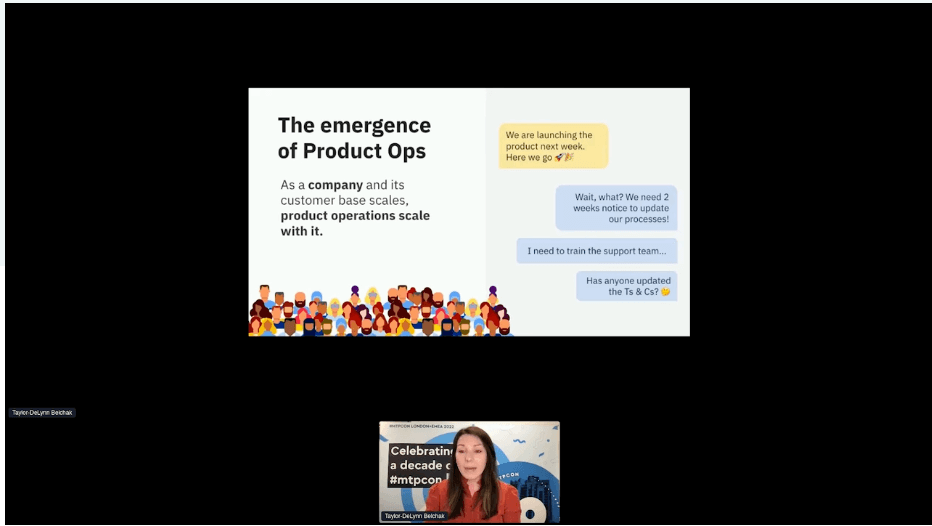Is it important for large enterprises to navigate the complexities of cross-functional collaboration? Only if they want to survive.
Product enterprises, due to their size, complexities, and having multiple products to develop and manage, are more prone to silos, miscommunication, and inefficiencies than your average startup. Enter the transformative power of Product Operations, the solution with the power to revolutionize how teams collaborate, communicate, and innovate.
Despite diligent effort, large enterprises often need help ensuring smooth cross-functional collaboration. The inherent complexity of coordinating across various departments, from development and marketing to sales and customer support, introduces a landscape rich with communication breakdowns and misalignment of priorities. These challenges can severely disrupt the trajectory of projects, affecting innovation and slowing down the delivery of value to customers. The essence of these obstacles is not an issue of lack of effort or commitment but it's actually more about the intricate dynamics of large organizations, where diverse teams and functions must align seamlessly to achieve common goals. This complexity calls for a strategic approach to bridging gaps, ensuring unity, and driving efficiency across all departments of the product enterprise.
Product Operations is like the backstage crew for product teams, making sure everything runs smoothly so product managers can shine in the spotlight.
Diana Soler, a Director of Product Operations, defines the essence of Product ops as building and driving operational excellence within product teams to optimize alignment, communication, and collaboration. This strategic positioning allows ProdOps to break down barriers and streamline workflows, ensuring that every department is moving towards a common goal.
Let's break down what the ProdOps role involves day to day.
1. Taking care of tools:
Product ops makes sure the product team has the best tools for the job, from chatting and gathering customer feedback to planning and sharing information. They pick the tools, deal with the sellers, and help everyone on the team use them.
2. Organizing customer feedback:
Product managers listen to what customers have to say, but Product ops organizes all this feedback. They sort it, make sense of it, and share it with the team so decisions are based on what customers really want.
3. Keeping an eye on data:
Product ops also looks after the numbers, setting up systems to track how well the product is doing. This helps the team see how users interact with the product and what needs improvement.
4. Pushing for experiments:
They encourage trying new things and make sure there's a clear way to test out ideas. This way, when someone new joins or wants to try something, there's a guide on how to do it right.
5. Helping with product launches:
When it's time to introduce new features or products, Product ops works with marketing and sales to get the word out. They prepare the details these teams need to attract customers and close deals.
6. Making communication easy:
Produdct ops keeps everyone talking smoothly, ensuring the product team and other departments stay in sync. They manage the tools that help share plans and progress, keeping everyone informed.
If your team is getting bigger and things are starting to feel hectic, it might be time to add a product ops role to your lineup.
As teams and products grow, things get busier, and that's where product ops comes in. Without them, product managers might get stuck doing routine tasks instead of focusing on making great products. With ProdOps handling the day-to-day, product managers have more time to think big and tackle the challenges that matter. In short, ProdOps keeps the product team running smoothly, making sure they have what they need to succeed.
To succeed in enhancing cross-functional collaboration, ProdOps relies on a suite of proven frameworks and communication strategies. Chris Butler, a co-founder of the ProdOps Alliance, emphasizes the importance of aligning teams with consistent artifacts and methods, ensuring that the entire organization is working from the same playbook. This alignment is not about enforcing rigid uniformity but about creating a shared understanding that in turn, empowers each team to contribute their best work towards shared objectives.
The impact of product ops on an organization can be transformative. Everyone in all sizes and roles of different product organizations understands the value of seamless collaboration and efficient workflows. This is where product operations shines. Teams that once worked in isolation now benefit from the sharing of ideas, better communication, and increased efficiency, leading to more creative solutions and a more cohesive approach to product development, marketing, and sales.
For those looking to delve deeper into the strategies and frameworks that enable ProdOps to be such a transformative force (no matter the size of your organization), you can join airfocus's upcoming roundtable event, "The Way to Seamless Collaboration: Product Ops" on April 18th.









Comments
Join the community
Sign up for free to share your thoughts